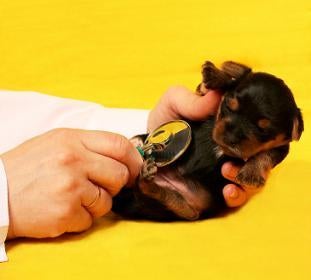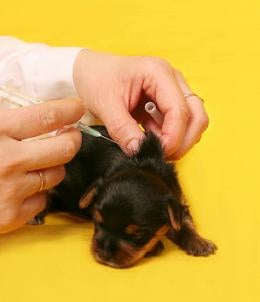Puppy Shots - All You Need To Know About Puppy Vaccinations
Puppy Vaccination Schedule & Information
Following the recommended puppy vaccination schedule is very important to your puppy's long-term health and well-being. Your veterinarian will be your best source of information regarding what canine vaccines to give, and when to give them. Here are some of the most frequently asked questions we receive everyday.
What Are Puppy Vaccinations For And What Do They Actually Do?
Puppy vaccinations are given to protect your pet from the life threatening diseases they come into contact with. When the vet injects your puppy with a vaccine, it "teaches" the puppy's immune system what a disease organism looks like. Your puppy's system will form anti-bodies to that disease making it possible for her to fight off that infection in the future.[google_ad:DOTR_CMS_468x60_InArticle1]
What Diseases Should My Puppy Be Vaccinated Against?
Your puppy should be vaccinated against the following dangers:
- Distemper
- Canine adenovirus
- Parvo
- Rabies
- Kennel Cough
- Coronavirus
Your vet may also recommend vaccinating for Leptospirosis and Lyme disease if you live in an area where these are a concern. Consult with your veterinarian to select the proper vaccines for your environment and your puppy.
Are There Separate Dog Vaccines For The Different Diseases?
The vaccines for the different diseases are given in one injection known as a 5-way or 7-way. These vaccines are usually a 1cc dose that is administered subcutaneously (under the skin.) An example of these vaccines is the rabies vaccination and the distemper vaccination.
Should All Puppies Be Immunized?
Yes. All puppies should be immunized to protect them from disease and also to reduce the spread of disease in the dog population.
What Age Should A Puppy Be When He Gets His First Puppy Shot?
A puppy can be vaccinated for Parvovirus as early as 5 weeks. A combination vaccine (5-way) should be given at 6 and 9 weeks. At 12 and 15 weeks of age your puppy will need another combination vaccine, possibly a 7-way, as well as a rabies vaccine. Adult dogs will also require a booster shot once a year.
What Are The Risks Or Side Effects My Puppy Might Experience From The Vaccines?
While puppy vaccines are generally safe for all dogs, there are a few things you should watch for after the shot has been given. Mild reactions include fever, soreness at the injection site, and loss of appetite. These minor reactions usually resolve within 24 hours without treatment.Uticaria is a moderate reaction of the skin and is exhibited as hives, rapid swelling and redness of the lips, around the eyes, and in the neck region. It is usually very itchy. Uticaria is the most common reaction in dogs and should be treated by your veterinarian immediately. In most cases of uticaria, you will see the symptoms soon after vaccination, often shortly after the puppy arrives home. Your vet will treat your puppy with an oral antihistamine such as Benadryl and with injectable corticosteroids.

The most severe reaction to dog vaccines is anaphylaxis. Anaphylaxis is a severe and sudden reaction that produces breathing difficulties due to swelling of the larynx. Other symptoms include sudden onset of vomiting, diarrhea, staggering, seizures and cardiovascular collapse. It is important to remember that these symptoms will occur quickly, usually before leaving the vet's office and when the puppy has had at least one previous exposure to the vaccine. While anaphylaxis is life threatening, it doesn't occur very often. Talk to your veterinarian about your concerns and be alert and watchful after your puppy is vaccinated.
When Is It Safe For My Puppy To Mingle With Other Dogs?
Before exposing your puppy to other dogs she needs to be fully immunized against the diseases that she may come into contact with. This means she should have had her 3rd puppy vaccine at 12 weeks before she is allowed to socialize with other dogs. Until then she is not fully protected against diseases such as Parvo that are highly contagious.
I Just Adopted A Beautiful Puppy From A Shelter And Don't Know What Vaccines He Has Had. What Should I Do?
Contact your veterinarian and he will advise you but generally it is a good idea to give your new pet the series of canine vaccines again, just to be safe.
[google_ad:DOTR_CMS_468x60_InArticle2]
My Puppy Is A Very Small Breed - Won't She Need A Smaller Dose Of The Puppy Shots?
No. Puppies are given the same dosage of the vaccine regardless of age, body weight, breed and gender. Giving a puppy a lesser amount of the vaccine would result in her not being fully immunized. Vaccines are given in a 1cc dose which is a small amount of medicine anyway.
We Live On A Farm And My Puppy Will Be Exposed To Other Animals. Will She Require Any Special Vaccines?
Check with your veterinarian for any additional vaccines your puppy may need. He may suggest the vaccines for Lyme disease (carried by ticks) or a 7-way vaccine. Of course the Rabies vaccine is going to be important this situation.
Other pages you may be interested in:
Feed your puppy the right way - What is the best dog food?
Teach your puppy some basic obedience training commands.
Puppy house training schedule.
Please consult the services of a Professional Dog Trainer, Behaviorist or Veterinarian before implementing any of the advice contained on this site.











 Your Privacy Choices
Your Privacy Choices